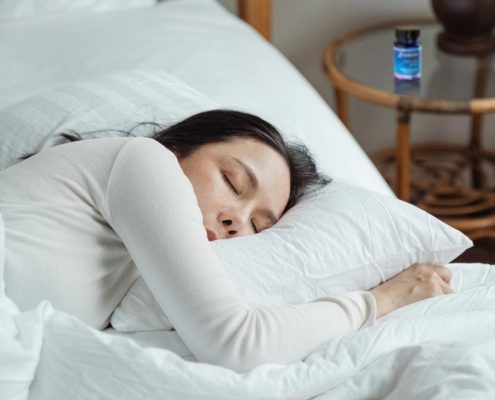Can CBN help you get better sleep?
We’ve all heard that we need to sleep well for good health…
So we change our diets and get more exercise to improve sleep and even use tech gadgets to track and report our sleep patterns, yet people still have trouble falling asleep when the day is done. It’s not surprising that people are asking about the relaxing qualities of CBD and cannabis for sleep.
How big is the problem? About one third of adults in the U.S. do not get enough sleep. The recommended amount of sleep for people between the ages of 18-60 is seven or more hours each night. When pain and anxiousness keeps you up at night, it’s even harder to make sure you get this minimum amount of sleep time. The problem can even bring on or exacerbate other problems, as sleeping less than seven hours is associated with a higher risk for obesity, diabetes, high blood pressure, heart disease, and mental distress. The upshot? Quality sleep is super important. CBD and a rising star CBN look uniquely promising, but can they help not only sleep quality, but other health concerns at the same time?
CBN: What is it and what are the Benefits?
 CBN (or Cannabinol) is often described as a milder, non-psychoactive version of THC, which makes sense because it derived from THC. As the THC compounds found in cannabis age, they break down and convert into different cannabinoids. This leads to the formation of a similar, yet much different cannabinoid called CBN. CBN has not been studied anywhere near as much as CBD or THC, so the research on its uses and benefits is more limited. Some of the potential uses and benefits observed in few studies include:
CBN (or Cannabinol) is often described as a milder, non-psychoactive version of THC, which makes sense because it derived from THC. As the THC compounds found in cannabis age, they break down and convert into different cannabinoids. This leads to the formation of a similar, yet much different cannabinoid called CBN. CBN has not been studied anywhere near as much as CBD or THC, so the research on its uses and benefits is more limited. Some of the potential uses and benefits observed in few studies include:
- Sleep Support. CBN has shown to have relaxing properties that could help conditions like insomnia. The THC-like effects of pain reduction and relaxing of muscles is helpful too. However, more research is required to quantify these effects.
- Discomfort relief. In a study of rats, CBN use showed relief in muscle and joint conditions like fibromyalgia. The study also noted that relief was better when CBD and CBN were used together.
- Neuroprotective properties. Recent studies have found that CBN could help with the buildup of amyloid plaques which are thought to be responsible for Alzheimers and early onset dementia. However, more research is required in this area as well. A team of researchers from Salk Institute have recently conducted a revealing study, discovering that CBN protects nerve cells from oxidative damage, a significant driver of cell death.
Active ingredient in cannabis protects aging brain cells
“We’ve found that cannabinol protects neurons from oxidative stress and cell death, two of the major contributors to Alzheimer’s,” says senior author Pamela Maher, a research professor and head of Salk’s Cellular Neurobiology Laboratory. CBN worked by protecting mitochondria, the cell’s powerhouses, within the neurons. In damaged cells, oxidation caused the mitochondria to curl up like donuts—a change that’s also been seen in aging cells taken from the brains of people with Alzheimer’s disease. Treating cells with CBN prevented the mitochondria from curling up and kept them functioning well. [View Salk CBN article]
What about Melatonin for Sleep?
A large majority of the ‘CBD for Sleep’ supplements available today contain varying levels of the common sleep-assisting hormone melatonin. Wait, hormone? Yes, melatonin is a natural hormone that is created by our bodies from another hormone, serotonin when we go to sleep. Lots of people take the popular melatonin as a ‘natural’ sleep aid, and it is generally considered to be safe, but what about if you take it every day? Some scientists think that if people take melatonin every day that the body gradually stops making its own and people may find it harder to get to sleep without it. This sounds a little bit scary as most people don’t want to be dependent on any substances, especially for something normal like sleeping.
CBN may act pharmacologically like THC
Even though THC isn’t necessarily thought of as a sleep-aid, it is definitely used by many for that purpose. Whether it simply quiets the mind from everyday troubles or relieves discomfort that may prevent sleep. THC is thought to go hand in hand with relaxing and winding down for sleep. One PubMed study found that “CBN, although in general less active, mimicked the effects of delta-9-THC in several pharmacological tests.”
Research is lacking on CBD and the minor cannabinoids, but one study looked at CBD for sleep.
Since the federal government still lists cannabis as a Schedule I illegal drug, long-term cannabis research has been sorely lacking. On top of that, cannabis plant material for research has been limited to one source considered low quality and not representative of the best the species has to offer.
In 2019, a study that looked at CBD for sleep quality showed CBD did positively effect those who tried it over a period of 3 months. 79% saw anxiousness levels drop within the first month of using CBD and 67% reported an improvement in sleep quality at the same time, and in some cases continued to improve over the next 2 months. They concluded that although large clinical trials are necessary, it appeared that CBD did offer improvements in stress related sleep loss for those in this study. Even Harvard Medical Review noted that CBD “is commonly used to address anxiousness, and for patients who suffer through the misery of insomnia, studies suggest that CBD may help with both falling asleep and staying asleep.”
CBD may impact stress hormone levels
One theory about how this works is that it may lower the levels of cortisol. Known as the stress hormone, cortisol levels tend to peak in the morning. But, those with stress may experience higher cortisol levels around bedtime, making sleep harder for them.
Other studies on CBD have also raised this question. For example, one found that taking CBD oil lowered cortisol levels in study participants, meaning it may remove a barrier to sleep. Another PubMed study found that when compared to a placebo, those who took CBD had a longer duration of sleep.
The bottom line is that CBD for sleep and other benefits shows interesting potential, but more study is needed.
The CDC’s advice for sleep centers around lifestyle changes. They include going to bed at the same time every night and turning off TVs and mobile devices in the bedroom to try to reduce screen time that prevents getting relaxed for sleep. We agree with these suggestions, and recommend CBD and CBN for sleep as a good choice due to the excellent safety profile of quality products.

 slyng
slyng







Leave a Reply
Want to join the discussion?Feel free to contribute!